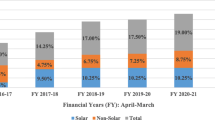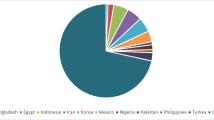Abstract
The impact of globalisation on the dissemination of renewable energy was analysed for ten Latin America countries for the period from 1980 to 2014. For that propose, was built a model where install capacity of renewable energy is explained by output, KOF globalisation index, and private capital stock. The richness of the short- and long-run relations between variables was analysed by a panel autoregressive-distributed lag model in the form of an unrestricted error correction mechanism. The results of the model’s estimation support a positive effect of the short-run impact of output per capita and long-run elasticities of globalisation and private capital stock per capita on renewable energy diffusion. That results that show that the globalisation can stimulate renewable energy sources evidencing that the process of integration of Latin America countries in the World is a benefit to the development of green energy technologies. The Latin America region policymakers must take advantage of the process of globalisation to reduce the costs of renewable energy technologies and develop policies encouraging the access of these technologies by households with low income that live in remote or rural regions to reduce the energy poverty, which plagues the countries from the Latin America region.

Similar content being viewed by others
References
Amann, E. (2002). Globalisation, industrial efficiency and technological sovereignty: Evidence from Brazil. The Quarterly Review of Economics and Finance, 42, 875–888.
Apergis, N., & Payne, J. E. (2010). Renewable energy consumption and economic growth: Evidence from a panel of OECD countries. Energy Policy, 38(1), 656–660. https://doi.org/10.1016/j.enpol.2009.09.002.
Breusch, T. S., & Pagan, A. R. (1980). The Lagrange multiplier test and its applications to model specification in econometrics. The Review of Economic Studies, 47(1), 239–253.
Driscoll, J. C., & Kraay, A. C. (1998). Consistent covariance matrix estimation with spatially dependent panel data. Review of Economics and Statistics, 80(4), 549–560. https://doi.org/10.1162/003465398557825.
Engle, R., & Granger, G. (1987). Cointegration and error correction: Representation. Estimation and Testing, Econometrica, 55, 251–276.
Friedman, M. (1937). The use of ranks to avoid the assumption of normality implicit in the analysis of variance’. Journal of the American Statistical Association, 32, 675–701.
Fuinhas, J. A., Marques, A. C., & Koengkan, M. (2017). Are renewable energy policies upsetting carbon dioxide emissions? The case of Latin America countries. Environmental Science and Pollution Research, 24(17), 15044–15054. https://doi.org/10.1007/s11356-017-9109-z.
Gielen, D., Boshell, F., Saygin, D., Bazilian, D., Wagner, N., & Gorini, R. (2019). The role of renewable energy in the global energy transformation. Energy Strategy Reviews, 24, 38–50.
Granger, C. W. J. (1981). Some properties of time series data and their use in econometric model specification. Journal of Econometrics, 28, 121–130.
Greene, W. (2002). Econometric analysis. Upper Saddle River: Prentice-Hall.
Griffith-Jones, S., Spratt, S., Andrade, R., & Griffith-Jones, E. (2017). Investment in renewable energy, fossil fuel prices and policy implications for Latin America and the Caribbean. Santiago: Economic Commission for Latin America and the Caribbean.
Hanratty, D. M., (1989). Ecuador: a country study. Washington, D.C.: Federal Research Division, Library of Congress, pp. 1–341. https://lccn.loc.gov/91009494. Accessed 25 Dec 2018.
Horbach, J., & Rammer, C. (2018). Energy transition in Germany and regional spill-overs: The diffusion of renewable energy in firms. Energy Policy, 121, 404–414.
International Energy Agency (IEA) (2018). Available at: https://www.iea.org/energyaccess/database/. Accessed 15 Jan 2019.
IMF, Investiments and Capital Stock. (2017). Available at https://www.imf.org/external/np/fad/publicinvestment/data/data122216.xlsx. Accessed 7 Dec 2018.
Johansen, J., & Juselius, K. (1990). Maximum likelihood estimation and inference on cointegration-with applications to the demand for money. Oxford Bulletin of Economics and Statistics, 52(2), 169–210.
Jones, T. (1998). Economic Globalisation and the environment: an overview of the linkages. OECD, Globalisation and the Environment: Perspectives from OECD and Non-Member Economies. Paris.
Koengkan, M. (2017a). The nexus between energy consumption, economic growth, and urbanization in Latin American and Caribbean countries: An approach with the PVAR model. Revista Valore, 6(2), 202–218. https://doi.org/10.22408/reva22201761%25p.
Koengkan, M. (2017b). The nexus between consumption of biofuels and economic growth: An empirical evidence from Brazil. Cadernos UniFOA, 12(35), 87–98.
Koengkan, M. (2017c). Is the globalization influencing the primary energy consumption? The case of Latin America and the Caribbean countries. Cadernos UniFOA, 12(33), 59–69.
Koengkan, M. (2018a). The decline of environmental degradation by renewable energy consumption in the MERCOSUR countries: An approach with ARDL modelling. Environment Systems and Decisions, 38(3), 415–425. https://doi.org/10.1007/s10669-018-9671-z.
Koengkan, M. (2018b). The positive impact of trade openness on consumption of energy: Fresh evidence from Andean community countries. Energy, 158, 936–943. https://doi.org/10.1016/j.energy.2018.06.091.
Koengkan, M., Fuinhas, J. A., & Marques, A. C. (2019a). The role of financial openness and China’s income on fossil fuels consumption: Fresh evidence from Latin American countries. GeoJournal. https://doi.org/10.1007/s10708-019-09969-1.
Koengkan, M., Santiago, R., Fuinhas, J. A., & Marques, A. C. (2019b). Does financial openness cause the intensification of environmental degradation? New evidence from Latin American and Caribbean countries. Environmental Economics and Policy Studies. https://doi.org/10.1007/s10018-019-00240-y.
KOF Globalization index. (2018). Available at: https://www.kof.ethz.ch/en/forecasts-and-indicators/indicators/kof-globalisation-index.html. Accessed 30 Jan 2019.
Lacal-Arántegui, R. (2019). Globalization in the wind energy industry: contribution and economic impact of European companies Roberto Lacal-Arantegui. Renewable Energy, 134, 612–628.
Lee, C.-C. (2005). Energy consumption and GDP in developing countries: A cointegrated panel analysis. Energy Economics, 27(3), 415–427. https://doi.org/10.1016/j.eneco.2005.03.003.
Lee, C.-C., Chang, C.-P., & Chen, P.-F. (2008). Energy-income causality in OECD countries revisited: The key role of capital stock. Energy Economics, 30(5), 2359–2373. https://doi.org/10.1016/j.eneco.2008.01.005.
Lee, C.-C., & Chen, P.-F. (2010). Dynamic modelling of energy consumption, capital stock, and real income in G-7 countries. Energy Economics, 32(3), 564–581. https://doi.org/10.1016/j.eneco.2009.08.022.
Leitão, N. C. (2014). Economic growth, carbon dioxide emissions, renewable energy and globalization. International Journal of Energy Economics and Policy, 4(3), 391–399.
Miozzo, M., Dewick, P., & Green, K. (2005). Globalisation and the environment: The long-term effects of technology on the international division of labour and energy demand. Futures, 37, 521–546.
Narayan, P. K., & Smyth, R. (2008). Energy consumption and real GDP in G7 countries: New evidence from panel cointegration with structural breaks. Energy Economics, 30(5), 2331–2341. https://doi.org/10.1016/j.eneco.2007.10.006.
Oddone, G., Marandino, J. (2018). The Monetary and Fiscal History of Uruguay 1960–2017. Becker Friedman Institute: For economics at the University of Chicago, Working Paper No. 60, pp. 1–34. https://bfi.uchicago.edu/sites/default/files/file_uploads/WP_2018-60.pdf. Accessed 4 Feb 2019.
Overland, I. (2015). Future petroleum geopolitics: consequences of climate policy and unconventional oil and gas (pp. 1–29). Handbook of clean energy systems London: Wiley.
Overland, I. (2016). Energy: The missing link in globalization. Energy Research & Social Science, 14, 122–130.
Pangawar, N., & Wu, J. (2012). Industry globalization and the performance of emerging market firms: Evidence from China. International Business Review, 21(2), 196–209.
Pesaran, M. H. (2004). General diagnostic tests for cross section dependence in panels. The University of Cambridge, Faculty of Economics. Cambridge Working Papers in Economics, No. 0435.
Pesaran, M. H. (2007). A simple panel unit root test in the presence of cross-section dependence. Journal of Applied Econometrics, 22(2), 256–312. https://doi.org/10.1002/jae.951.
Pesaran, M. H., Shin, Y., & Smith, R. P. (1999). Pooled mean group estimation of dynamic heterogeneous panels. Journal of American Statistical Association, 94(446), 621–634.
Pesaran, M. H., & Smith, R. (1995). Estimating long-run relationships from dynamic heterogeneous panels. Journal of Econometrics, 68(1), 79–113. https://doi.org/10.1016/0304-4076(94)01644-F.
Sovacool, B. (2014). What are we doing here? Analyzing fifteen years of energy scholarship and proposing a social science research agenda. Energy Research & Social Science, 1, 1–29.
Storper, M. (2002). Globalization and knowledge flows and industrial geographer’s perspective. In J. Dunning (Ed.), Regions, globalization, and the knowledge-based economy. Oxford: Oxford University Press.
United Nations. (2018). World investment report 2018: Investment and new industrial policies. Geneva: United Nations Publication.
Villamar, C. M. (1981). Paquisha: toda la verdade. Quito: Letra Nueva.
Vu, K. M. (2018). Embracing globalization to promote industrialization: Insights from the development of Singapore’s petrochemicals industry. China Economic Review, 48(C), 170–185.
Washburn, C., & Pablo-Romero, M. (2019). Measures to promote renewable energies for electricity generation in Latin American countries. Energy Policy, 128, 212–222.
Wooldridge, J. M. (2002). Econometric analysis of cross section and panel data. London: The MIT Press Cambridge.
World Bank Data. (2019). Available at: http://www.worldbank.org/. Accessed 19 Feb 2019.
World Trade Organisation. (2019). World Trade Organisation. Fonte: World Trade Statistical Review 2018: https://www.wto.org/english/res_e/statis_e/wts2018_e/wts18_toc_e.htm. Accessed February 1, 2019.
Zuluaga, M., & Dyner, I. (2007). Incentives for renewable energy in reformed Latin-American electricity markets: The Colombian case. Journal of Cleaner Production, 15, 153–162.
Funding
This study was funded by National Funds of the FCT – Portuguese Foundation for Science and Technology within the project UID/ECO/04007/2019, and NECE - Research Unit in Business Science and Economics, sponsored by the FCT and Higher Education, project UID/GES/04630/2019.
Author information
Authors and Affiliations
Corresponding author
Ethics declarations
Conflict of interest
All authors declare that they have no conflict of interest.
Ethical approval
This article does not contain any studies with human participants performed by any of the authors.
Additional information
Publisher's Note
Springer Nature remains neutral with regard to jurisdictional claims in published maps and institutional affiliations.
Rights and permissions
About this article
Cite this article
Koengkan, M., Poveda, Y.E. & Fuinhas, J.A. Globalisation as a motor of renewable energy development in Latin America countries. GeoJournal 85, 1591–1602 (2020). https://doi.org/10.1007/s10708-019-10042-0
Published:
Issue Date:
DOI: https://doi.org/10.1007/s10708-019-10042-0




